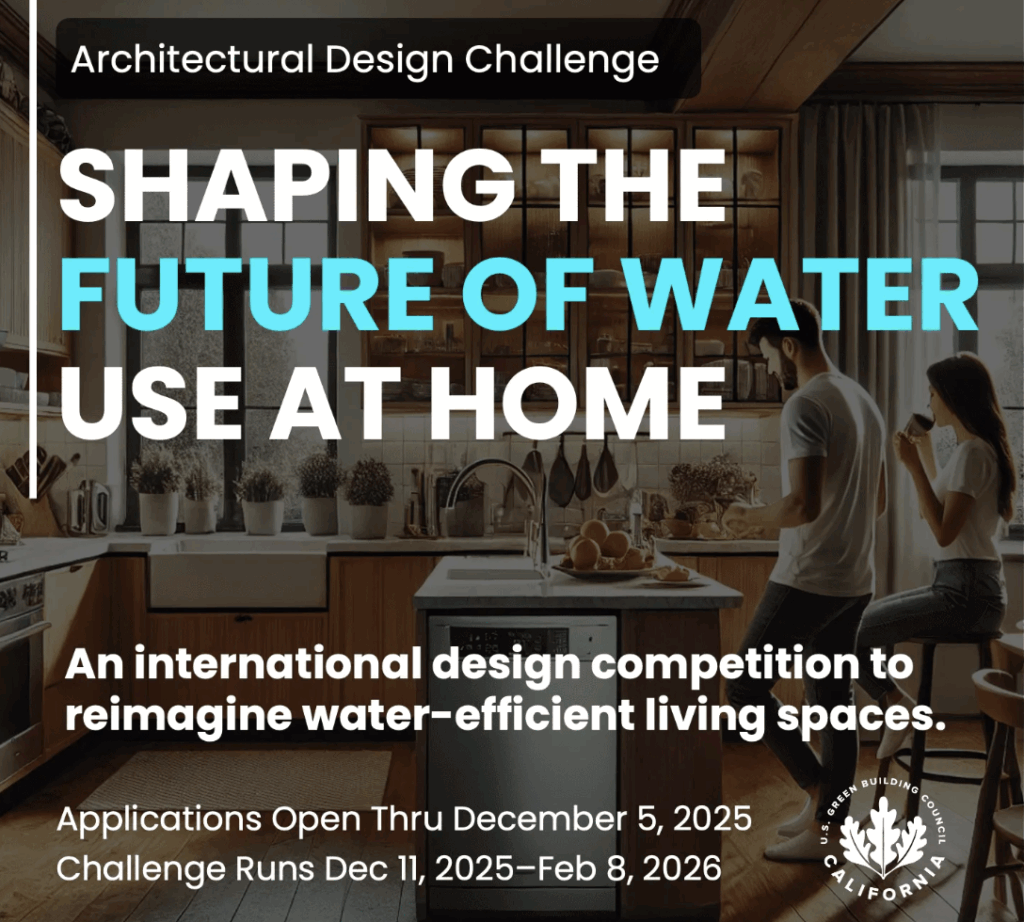50L Home is a holistic vision to transform building systems and communities for a water-efficient and low carbon future. Our vision is a future where 50L (13 gallons) of daily water consumption per person per day feels like 500L (132 gallons) at low carbon.
The coalition brings companies, civil society organizations, intergovernmental organizations, local governments and knowledge leaders together to develop, scale and implement innovations for systems level change in domestic urban water management as well as responsible and highly efficient water and energy usage in the home.

Innovative Challenge Seeks Scalable Solutions for Reimagining Residential Design through Innovative, Water-Efficient Living Spaces
LOS ANGELES, CA (September 25, 2025) Water is one of the world’s most precious and finite resources—critical to sustaining life, agriculture, and industry. Yet residential water consumption remains a significant contributor to global water stress. The U.S. Green Building Council California (USGBC-CA) has announced the launch of “Shaping the Future of Water Use at Home,” a global architectural design challenge (ADC) that invites architects, engineers, designers, and students to reimagine residential design through innovative, water-efficient living spaces, accelerating the shift toward a water-positive future.
Participants will propose market-ready, scalable solutions that promote water-efficient living by optimizing water use, reducing energy demand, maintaining comfort and convenience, and aligning with UN Sustainable Development Goal 6: Ensuring access to water and sanitation for all.
To apply for the Challenge, please visit https://usgbc-ca.org/water-adc/.
The water-energy-carbon (WEC) nexus shows us how interconnected water use, energy consumption, and carbon emissions truly are. At 50L Home, we’re addressing these complex issues head-on. Our latest Action Paper, in partnership with Arcadis, provides a practical roadmap for action by focusing on implementation.
Through our pilot project in Los Angeles, we:
The result? We’ve shown how significantly we can reduce both water and energy consumption. But this challenge requires collaboration between policymakers, industries, and communities. Together, we can drive meaningful change.
Download the full Action Paper and join us in operationalizing the WEC nexus to build more sustainable homes.
We envision a future where companies, policymakers, innovators, researchers and communities work together to reinvent urban water use to promote water security and reduce carbon emissions (by saving energy used to heat water) without compromising comfort and quality of life, making 50 liters per person per day feel like 500 liters.
This ambitious goal, if achieved at scale, could reduce energy consumption, accelerate the journey to net zero, and help alleviate household water and energy costs in cities around the world.
We hope to instill the importance of responsible water and energy consumption, making 50 liters of daily water use per person a reality. To achieve this and add value, we have four key focus areas:
Advancing solutions to address the three R’s to water efficiency: reduce, recycle, and reuse water in homes, and within the wider urban water system.
Collaborating on pilot projects in water-stressed cities and mobilizing local actors to learn and inform the path to global scale and replication.
Knowledge is power, which is why reshaping peoples’ relationship with water will help inspire daily behavioral lifestyle changes that can bring effective change to our water crisis.
Advancing policy, regulatory and industry framework changes to transform home use and water supply or treatment.
“Day Zero” is closer than you think. A quarter of the global population currently faces extremely high water stress annually. To add, nearly 60 percent of the global population is expected to live cities by 2030, which, in turn, means a higher demand for water in urban areas. On average, the energy required for household water use is approximately 18% of total energy use in the home, contributing to greenhouse gas (GHG) emissions. Without effective action and support now, many cities worldwide face the inevitability of their water sources running dry.




We held three roundtables in London, UK throughout 2023 to explore how technology, customer behavior, and policy impacts this nexus in urban homes.
The roundtable discussions led us to turn our collective findings into useful resources for cities, states, and federal level government so that they can transform their water systems.
Findings from the roundtables are summarized in our action paper “Operationalizing Water-Energy-Carbon Nexus for Homes,” drafted with our partner Arcadis. On October 8th, we introduced the paper at the University of East London with panel discussions from industry experts.
| January, 2025 | Policy paper release – “The High Cost of Cheap Water” |
| February, 2025 | Release of Los Angeles pilot data |
| March 20, 2025 |
Presentation: Collaborative Water Futures: Lessons from Los Angeles for the Borderlands and Beyond (El Paso, Texas, USA) |
| May 22, 2025 |
US Green Building Council - CA Annual Conference 2025 (San Francisco, California, USA) |
| June 21–29, 2025 |
London Climate Action Week (London, UK) |
| August 24–28, 2025 |
World Water Week (Stockholm, Sweden) |

White paper on how cities can integrate water reuse and transform their water systems

White paper exploring the embedded energy and carbon costs of water for Los Angeles